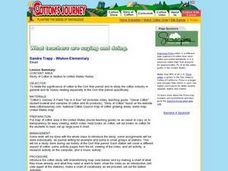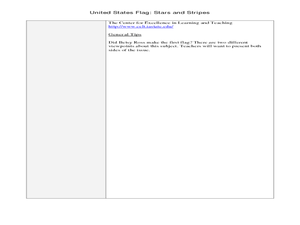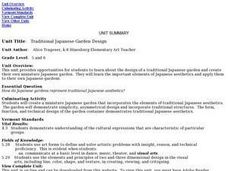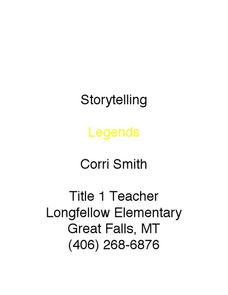Curated OER
What is a Democracy?
Young scholars identify what makes a country democratic and compare United States and Indian political party symbols. They create their own political party and party symbol. They create a campaign speech, participate in the voting...
Curated OER
Combating Corrosion
Study corrosion on bronze statues with a hands-on lesson. As pupils place a penny in water with salt, they observe the changes in the penny throughout a period of a week. They then analyze the pre-conservation and the...
Curated OER
Contributions of Ancient Egypt and China
Second graders study the contributions of Ancient Egypt and China, which have had an impact on world history, with emphasis on written language, laws, calendars, and architectural monuments such as the Pyramids and the Great Wall of China.
Curated OER
Flawed Democracies
Ninth graders examine the struggle for equal opportunity. In this American Government lesson, 9th graders create a timeline outlining various groups' struggles for equal opportunity. Students research and construct a timeline to...
Curated OER
all About the States
Students conduct Internet research about the states and use educational software to graphically organize the facts they have studied. As a class, students create posters and bulletin boards of the 50 states.
Curated OER
Slavery in Virginia
Fourth graders assess primary sources to analyze the effects plantation life and slavery had on Colonial Virginia. They study the issues of slavery, rural life, movements, colonization and revolution. Each student makes predictions,...
Curated OER
Baseball Cards
Students read a short story on baseball cards and reflect on Honus Wagner's decision to withdraw his card. In this baseball cards lesson plan, students study how children used cards in the 1930's and express their understanding of Honus...
Curated OER
Cotton Journey
Students use "Cotton Journey-A Field Trip In A Box" kit to relate the significance of cotton to the Civil War period and to study the cotton industry in general.
Curated OER
Our Compromise, Our Constitution
Sixth graders explore, analyze and study our constitutional government and become aware of the purpose of our government. They assess the basic rights that are protected by the United States Constitution through graphic organizers and...
National First Ladies' Library
Will the Real Pocahontas Please Stand Up?
Learners explore the life of Pocahontas and Powhatan Indians. After studying information on a given website, students compare and contrast what they read about Pocahontas and what they previously thought of her. They explore life in a...
Curated OER
Causes of School Violence
Students examine school violence. In this school violence lesson, students listen to a teacher-led lecture regarding statistics and studies about school violence. Students discuss bullying and school violence.
Curated OER
Why Are Celebrations Important?
Learners complete a variety of activities in their study of Chinese culture. They explore the Chinese New Year, zodiac, calligraphy, dragon kites, lanterns, games, and songs among others.
Curated OER
Modern Art Styles of Matisse
Students study the history of Matisse as an artist and focus upon his influences upon the style of art that he was famous for. The learners perform research about the life and works. Then they create a work of art that is similar to the...
Curated OER
United States Flag: Stars and Stripes
Students study the symbols and history of the United States flag. In this United States flag lesson, students complete a KWL about the U.S. flag. Students then visit a website to learn about the American flag and discuss the topic....
Curated OER
Critical Reading, Imaginative Writing and the Montage
Young scholars discuss the difference between primary and secondary sources and consider how an exhibit is researched. They design and create a montage that reflects themselves in a social and historical context.
Curated OER
Native American Gender Roles in Maryland
Students compare conditions of women in America and other lands (including colonists), and discover that women's status in their community was directly related to social hierarchy, religious culture, and natural environment in which they...
Curated OER
We the People v. We the Children of the World
Students compare the United Nations Declaration of the Rights of the Child to the Bill of Rights. In this social justice lesson, students read and analyze both documents. Students discuss how the documents compare and then write their...
Curated OER
Ben Franklin
Learners study Ben Franklin and why he was an important person in our country's development. They draw a picture of him by following step by step oral instructions.
Curated OER
Why a President? Why not a King?
Young scholars research how and why a country elects to have an executive branch of the government. They study the office of the Presidency of the US.
Curated OER
Traditional Japanese Garden Design
Students create a miniature Japanese garden that incorporates the elements of traditional Japanese aesthetics. They study the simplicity, asymmetrical design and incorporate traditional structures.
Curated OER
Why Do We Need Limited Government?
Students study how limited government protects individual rights and identify the limits that are placed on US authorities. They investigate the meaning of discrimination and individual rights as they complete the attached worksheet.
Curated OER
Teaching Lewis and Clark: Why Fort Clatsop?
Students study the path Lewis and Clark took on their famous trans-American journey. They participate in an online activity that allows them to examine considerations the Expedition made when deciding where to spend the winter of 1805-06.
Curated OER
Celebrating Heroes That Surround Us
Learners investigate the concept of a hero. They write in journals to find definitions and create hero symbols. Also students conduct research to create a banner of quotations made by famous heroes who fall under the definition generated...
Curated OER
Storytelling
Learners study and participate in a Native American traditional learning experience--storytelling. They read legends and choose a legend to tell and illustrate.

























